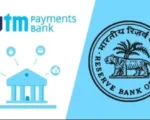RBI Directs Paytm Payments Bank to Cease Accepting New Deposits in Accounts and Digital Wallets from March.
Paytm Chief Executive Vijay Shekhar Sharma met the Indian central bank on Monday to discuss plans to address regulatory concerns, two sources with direct knowledge of the talks said on Tuesday, days after the regulator imposed curbs on its banking affiliate.
The Reserve Bank of India (RBI) told Paytm Payments Bank last Wednesday to stop accepting new deposits in its accounts and its popular digital wallets from March, citing supervisory concerns and non-compliance with rules.
“Discussions are on about addressing RBI’s regulatory concerns, and the company has sought an extension of the February 29 deadline,” said one of the sources.
Paytm has also been seeking clarity from the RBI regarding the transfer of its licence for the wallets business and digital highway toll payment service Fastag, the source said.
“The RBI heard Paytm out without making any commitments,” a second source said.
Paytm and the RBI did not immediately respond to Reuters’ request for comment.

As of Monday, Paytm’s shares had plummeted by approximately 42 percent, resulting in a market value loss of $2.5 billion (roughly Rs. 20,762 crore). Concerns about the broader business’s impact emerged, particularly as Paytm Payments Bank powers most features of the digital payments app, competing with platforms like Walmart’s PhonePe and Google.
Last week, a source familiar with the matter suggested that the RBI’s regulatory crackdown could potentially lead to the cancellation of Paytm’s license.
Following a Reuters report on Tuesday indicating an investigation by India’s federal anti-fraud agency into potential violations of foreign exchange rules by platforms operated by Paytm, the stock hit a record low. However, a Paytm spokesperson refuted any violations of foreign exchange law, dismissing the allegations as “unfounded and factually incorrect.”
Despite these challenges, Paytm’s shares later rebounded, experiencing an 8 percent surge during the day and ultimately trading 6 percent higher at Rs. 465.
Avinash Gorakshakar, head of research at Profitmart Securities, suggested that the share movement could be a “dead-cat bounce” following the recent downturn, emphasizing the lingering negative news affecting the stock.
Bernstein adjusted its target share price to Rs. 600 from Rs. 950 while maintaining an outperform rating. Despite acknowledging the lasting impact of regulatory actions on investors’ assessment of business model risk and management’s ability to handle regulatory risk, Bernstein analysts expressed confidence in Paytm’s ability to successfully implement operational changes to navigate the imposed restrictions.


















